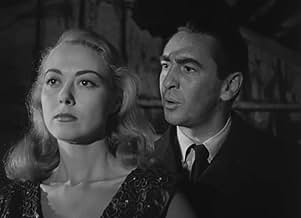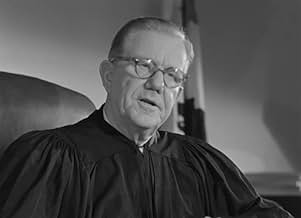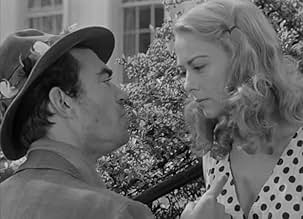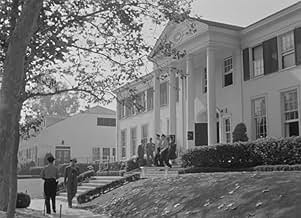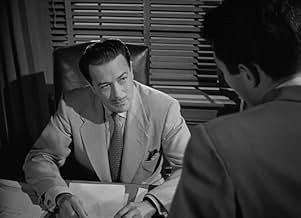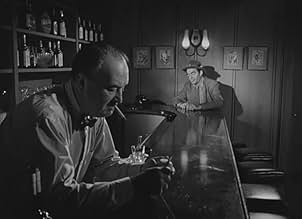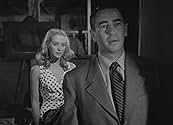Ajouter une intrigue dans votre langueLawyer defends migrant worker falsely accused of two murders.Lawyer defends migrant worker falsely accused of two murders.Lawyer defends migrant worker falsely accused of two murders.
Frank Baker
- Court Stenographer
- (uncredited)
Marshall Bradford
- Coroner
- (uncredited)
Ralph Brooks
- Courtroom Photographer
- (uncredited)
Benny Burt
- Citizen
- (uncredited)
Jack Carr
- Angry Citizen
- (uncredited)
Robert Carson
- Jury Foreman
- (uncredited)
Ralph Dumke
- Bartender
- (uncredited)
Richard Emory
- Reporter
- (uncredited)
Avis en vedette
This is far from the best Don Siegel movie. But, despite flaws in writing and acting, it's gripping and moves along, keeping the viewer on the edge of his or her seat.
Nothing is really credible. Theresa Wright as an itinerant farmer's wife? Actors with pronounced New York accents as menacing rednecks? And something about the script seems truly sub-par. The dialogue is not grammatical and this is not a matter of simulating regional speech or signifying class. The dialogue is just not well written.
The music, too, is strangely self-contradictory. At first it is pure schmalz, and Don Siegel is not the man for romance, even if it's romantic noir. Then a theramon is introduced and it sounds better.
Despite quibbling on my part, it's an engrossing movie. Believable? Not exactly. But, if one cuts it some considerable slack, it works well as a suspenseful kind-of noir.
Nothing is really credible. Theresa Wright as an itinerant farmer's wife? Actors with pronounced New York accents as menacing rednecks? And something about the script seems truly sub-par. The dialogue is not grammatical and this is not a matter of simulating regional speech or signifying class. The dialogue is just not well written.
The music, too, is strangely self-contradictory. At first it is pure schmalz, and Don Siegel is not the man for romance, even if it's romantic noir. Then a theramon is introduced and it sounds better.
Despite quibbling on my part, it's an engrossing movie. Believable? Not exactly. But, if one cuts it some considerable slack, it works well as a suspenseful kind-of noir.
MacDonald Carey stars as a public defender taking on the case of a migrant farm worker accused of killing his employer in this unusual RKO production. Directed stylishly by Don Siegel and marvelously photographed by the great John Alton, whose penchant for deep, angular shots is on display throughout, Count the Hours has plenty of the ingredients you'd expect a noir classic to feature. Sadly, it's let down by a drab screenplay by Karen Dewolf and a dull, Lon Chaney Jr.-style performance by John Craven as the falsely accused handy man. The film also suffers from a Louis Forbes score that features an overdone theremin theme whenever the real villain appears on the screen. Count the Hours looks great and also features good performances by Teresa Wright (in a role that seems tailor made for Patricia Neal) and Jack Elam, but on balance, it remains a frustrating though watchable failure.
Count the Hours (AKA: Every Minute Counts) is directed by Don Siegel and written by Karen DeWolf and Doane R. Hoag. It stars Macdonald Carey, Teresa Wright, John Craven, Jack Elam, Dolores Moran, Adele Mara and Edgar Barrier. Music is by Louis Forbes and cinematography by John Alton.
When a farmer and his housekeeper are murdered, suspicion falls on the hired hand George Braden (Craven). Owning a gun that matches the bullets used in the killings, Braden and his wife Ellen (Wright) are taken in for questioning when Ellen panics and is seen to throw the weapon into a lake. Under pressure and wanting to free his wife from duress, Braden confesses to the crime and finds himself on trial for his life. Enter Doug Maddison (Carey), a local lawyer who comes to believe that Braden is innocent and faces a fight against the clock to save Braden from the hangman's noose.
The pairing of Don Siegel and John Alton alerts the noir crowd to this compact low budget race against the clock thriller. In truth it's standard fare on a plot basis, with a mixed bag of acting performances (Elam and Wright exempt) and poor use of the Theramin in the musical score (it telegraphs what we should expect and feels on this occasion it's in the wrong movie), but within simplicity of story also comes potent points of worth.
As the clock ticks down and the stakes are raised, Siegel and the writers slot in the distasteful workings of the human being. Not only is there the running theme of the law quite frankly being an ass, but there is the bite of the rumour mill, a man forcing himself on to a desperate woman (Siegel zooms in for an emphasised facial shot that is bone chilling) and psychiatry playing a judicial hand; and not a good one at that!
Then there is Alton bringing his photographic tricks to compliment Siegel's efforts to lift a standard screenplay to greater things. Angular shots feature but it's with shadows and light that Alton excels, none more so than with the prison sequences. Here is where a frantic Braden is being held and it is a caged hell, because Alton highlights the shadows from the bars on the doors and windows as well, there is no escape from bars, they literally are all around, with one shot showing Alton at his best.
It's little seen and most likely forgotten about, and certainly its qualities have been ignored by the none film noir loving crowd, yet this is well worth a peek for those film lovers who like trawling the back alleyways for Siegel and Alton peccadilloes. 7.5/10
When a farmer and his housekeeper are murdered, suspicion falls on the hired hand George Braden (Craven). Owning a gun that matches the bullets used in the killings, Braden and his wife Ellen (Wright) are taken in for questioning when Ellen panics and is seen to throw the weapon into a lake. Under pressure and wanting to free his wife from duress, Braden confesses to the crime and finds himself on trial for his life. Enter Doug Maddison (Carey), a local lawyer who comes to believe that Braden is innocent and faces a fight against the clock to save Braden from the hangman's noose.
The pairing of Don Siegel and John Alton alerts the noir crowd to this compact low budget race against the clock thriller. In truth it's standard fare on a plot basis, with a mixed bag of acting performances (Elam and Wright exempt) and poor use of the Theramin in the musical score (it telegraphs what we should expect and feels on this occasion it's in the wrong movie), but within simplicity of story also comes potent points of worth.
As the clock ticks down and the stakes are raised, Siegel and the writers slot in the distasteful workings of the human being. Not only is there the running theme of the law quite frankly being an ass, but there is the bite of the rumour mill, a man forcing himself on to a desperate woman (Siegel zooms in for an emphasised facial shot that is bone chilling) and psychiatry playing a judicial hand; and not a good one at that!
Then there is Alton bringing his photographic tricks to compliment Siegel's efforts to lift a standard screenplay to greater things. Angular shots feature but it's with shadows and light that Alton excels, none more so than with the prison sequences. Here is where a frantic Braden is being held and it is a caged hell, because Alton highlights the shadows from the bars on the doors and windows as well, there is no escape from bars, they literally are all around, with one shot showing Alton at his best.
It's little seen and most likely forgotten about, and certainly its qualities have been ignored by the none film noir loving crowd, yet this is well worth a peek for those film lovers who like trawling the back alleyways for Siegel and Alton peccadilloes. 7.5/10
A robber breaks into a farm house. He is confronted by the owner and ends up killing the elderly couple. George Braden and his wife Ellen (Teresa Wright) are the neighbors. After some questionable responses, George is arrested for the murders. Doug Madison (Macdonald Carey) takes the case despite not believing in George's innocence.
At first, I thought some of this plot goes too far. I don't want to nitpick but I can't believe that they couldn't find the gun. Everybody knows where she threw it. It's not a raging river. Then I relaxed about it and realized that it's more about the acting style. The movie is doing that old melodramatic style. Teresa Wright is a great actress, but she's using her skills to do her utmost overwrought acting. I actually grew to like the plot especially if they could tweak some of it. I can see it be remade into something better.
At first, I thought some of this plot goes too far. I don't want to nitpick but I can't believe that they couldn't find the gun. Everybody knows where she threw it. It's not a raging river. Then I relaxed about it and realized that it's more about the acting style. The movie is doing that old melodramatic style. Teresa Wright is a great actress, but she's using her skills to do her utmost overwrought acting. I actually grew to like the plot especially if they could tweak some of it. I can see it be remade into something better.
MacDonald Carey and Teresa Wright, both of whom starred in Hitchcock's Shadow of a Doubt, work together again in a less prestigious film, "Count the Hours" from 1953, directed by Don Siegel.
Wright is Ellen Braden, whose husband George (John Craven), a migrant worker, is arrested for the murder of an elderly man and his housekeeper that was done apparently during a robbery - the man kept a lot of money in his house.
When asked if he has a gun, he at first says no. His wife runs home and throws the gun in the lake, but she's seen doing it. By then he's admitted to having one. He's believed to be guilty.
Carey plays attorney Doug Madison, who is asked to take the case but refuses. After speaking with Mrs. Braden, he changes his mind. He's convinced that they have to find the gun. But when they do, it's a disappointment. Doug believes in George's innocence, which means they have to find the killer.
Pretty good mystery-suspense film which also features Jack Elam. Wright is sympathetic as the pregnant Ellen who believes in her husband, but John Craven doesn't register much.
Carey was an affable leading man who found his great success on Days of Our Lives. He had a wonderful speaking voice and a gentle presence. Elam is his usual evil-looking and sleazy self.
On the ordinary side but tense nonetheless.
Wright is Ellen Braden, whose husband George (John Craven), a migrant worker, is arrested for the murder of an elderly man and his housekeeper that was done apparently during a robbery - the man kept a lot of money in his house.
When asked if he has a gun, he at first says no. His wife runs home and throws the gun in the lake, but she's seen doing it. By then he's admitted to having one. He's believed to be guilty.
Carey plays attorney Doug Madison, who is asked to take the case but refuses. After speaking with Mrs. Braden, he changes his mind. He's convinced that they have to find the gun. But when they do, it's a disappointment. Doug believes in George's innocence, which means they have to find the killer.
Pretty good mystery-suspense film which also features Jack Elam. Wright is sympathetic as the pregnant Ellen who believes in her husband, but John Craven doesn't register much.
Carey was an affable leading man who found his great success on Days of Our Lives. He had a wonderful speaking voice and a gentle presence. Elam is his usual evil-looking and sleazy self.
On the ordinary side but tense nonetheless.
Le saviez-vous
- AnecdotesAfter Director of Photography John Alton agreed to shoot this movie, he asked Producer Benedict Bogeaus how much he had budgeted for rigging - the system of overhead pipes, brackets, ropes, and cables that suspend lights over a film set. Bogeaus told him four thousand dollars. "Give me two thousand dollars above my salary and I won't use any rigging," said Alton. He did it by using almost no overhead lighting at all, contributing to the film's rich visual atmosphere.
- GaffesThe screen shows a newspaper article stating that George Braden is about to go on trial for the murder of Fred Morgan. However, two people were killed, so both names should have been given.
- ConnexionsReferenced in Mau Mau Sex Sex (2001)
Meilleurs choix
Connectez-vous pour évaluer et surveiller les recommandations personnalisées
Détails
- Date de sortie
- Pays d’origine
- Langue
- Aussi connu sous le nom de
- Count the Hours!
- Lieux de tournage
- société de production
- Consultez plus de crédits d'entreprise sur IMDbPro
- Durée
- 1h 16m(76 min)
- Couleur
- Rapport de forme
- 1.37 : 1
Contribuer à cette page
Suggérer une modification ou ajouter du contenu manquant

